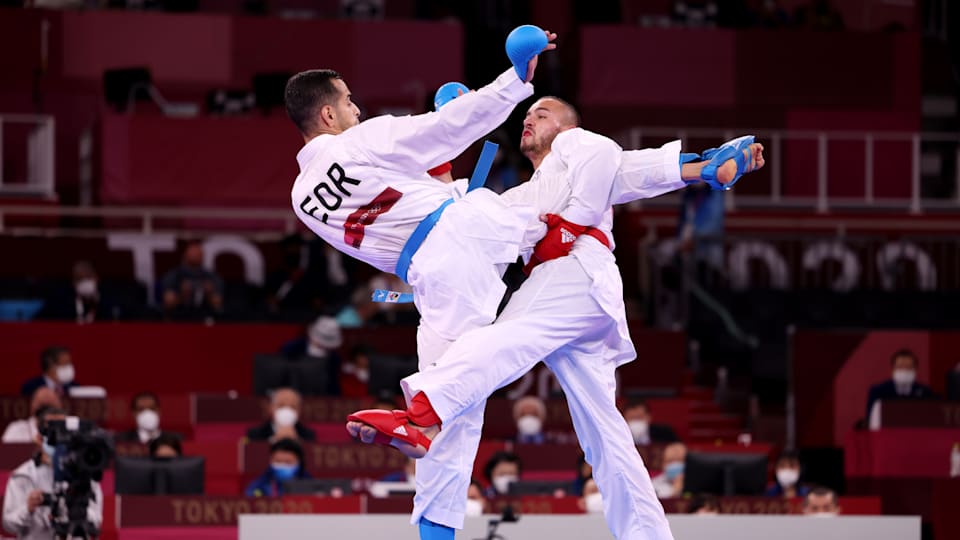Refugee athlete Hamoon Derafshipour demonstrates his punching prowess in Olympic debut at Tokyo 2020
Hamoon Derafshipour and wife Samira always shared the same dream, to make an Olympic Games. Together the coach-karateka couple finished third in the elimination round of the men's kumite competition, just one place shy of the semi-finals in Tokyo.

Hamoon Derafshipour of the IOC Refugee Olympic Team fell just short of qualifying for the semi-finals of the men's kumite -67kg competition at Tokyo 2020.
The Iran-born karateka finished his pool in third place after winning two bouts and losing two. Unfortunately, his wins didn't guarantee him enough points to see him into either first or second place subsequently eliminating him from the competition.
Derafshipour faced some tough opponents in his pool including the reigning world champion and two-time European champion Steven da Costa of France.
Nevertheless, the refugee athlete showed his masterful punching prowess to ensure victories over fellow pool rivals Kalvis Kalnins (5:3) and Andres Eduardo Madera Delgado (9:3). The former truly tested Derafshipour's physical resilience, knocking him to the floor twice with punches to face later deemed too aggressive by the judges.
It had been Derafshipour's dream to compete with his wife in his corner and it was an ambition realised on Thursday (5 August).
The karateka's wife, and coach, Samira Malekipour was with her husband every step of the way, using her position to challenge referee calls with video review.
Hamoon Derafshipour: a karateka with a dream
“I believe karate is in my blood.”
Refugee Olympic Athlete Hamoon Derafshipour shared his belief with conviction to Olympics.com ahead of his competition in Tokyo.
“I grew up with karate, and karate starts with respect and finishes with respect.”
When news broke that karate would be featuring at the Tokyo 2020 Olympics Games, the 2018 world kumite bronze medallist knew that he had to do whatever it took to be there and compete.
For the Iran-born athlete, there was only a person who could help him realise that dream of Olympic glory – his wife and coach, Samira Malekipour.
Derafshipour met the 2010 Asian Games kumite bronze medallist while competing internationally. After a knee injury ended her own competitive career, Malekipour invested her time and energy into coaching.
With their shared passion for karate, and love for one another, the two opened a karate academy in their hometown in Iran. Its doors welcomed over 400 aspiring students.
But when Derafshipour realised that his coach would be unable to train him for the Olympics, the two made the ultimate sacrifice to leave their lives in Iran and seek refuge in Canada.
With support from the IOC Refugee Athlete Scholarship holder scheme, Derafshipour made it to Tokyo, and the couple are ready to take on the world.
He couldn’t be more excited.
“We are both together, so it’s a dream” - Hamoon Derafshipour
Fighting with love
“When we are training, she’s my coach not my wife.” Derafshipour says, explaining the dynamic of the unique working relationship.
Kumite is a discipline of karate which involves sparring against an opponent. The karateka must try to land blows on their opponent in an 8m x 8m area over the course of three minutes. The event is broken down into weight division so, as the karatekas take to the mat, they are evenly matched.
When global COVID-19 restrictions affected the lives of the Canadian newcomers, training for the Games became much more complex.
Malekipour was compelled to step up, and go above and beyond, so that the couple were able to realise their Olympic dream.
“It was a little bit hard for her because of the pandemic, because in Canada I couldn’t train with other players, and I was training with Samira. So, she had two jobs, as a partner for sparring and kumite, and as a coach.”
Fighting for love, for the husband and wife, took on a whole new meaning.
A refugee with winning spirit
After an additional year of waiting, the Games are now finally here, and there is only one thing on Derafshipour’s mind for Tokyo 2020:
“I know being in the Olympics is a good achievement. But for me and for Samira, it’s not. We want a medal, and we want the best medal, the gold one.”
With a strong competition history behind the karateka, medalling is a very real possibility. For the 28-year-old it would act as a symbol of defiance to those that ever doubted his, and Samira’s, ambitions.
“Everyone told me it would impossible to be in person for this Olympics. Everyone, maybe my close family. But I changed impossible to possible and right now we’re going to Olympics, and I’m so happy.”
Derafshipour’s expectations are not just reserved for him and his wife. He believes that his fellow refugee teammates should also be respected as competitors:
“We [refugees] are not going to the Olympics just to be a person at the Olympics. We are going to the Olympics to bring back our medals and we are competing with all our mind.”
With enough will in the world the Iranian ultimately believes all refugees are capable of achieving whatever they put their mind to. The trick is perseverance.
“I believe if they want to change everything, they can. Just start and keep going and keep going and never give up.”
